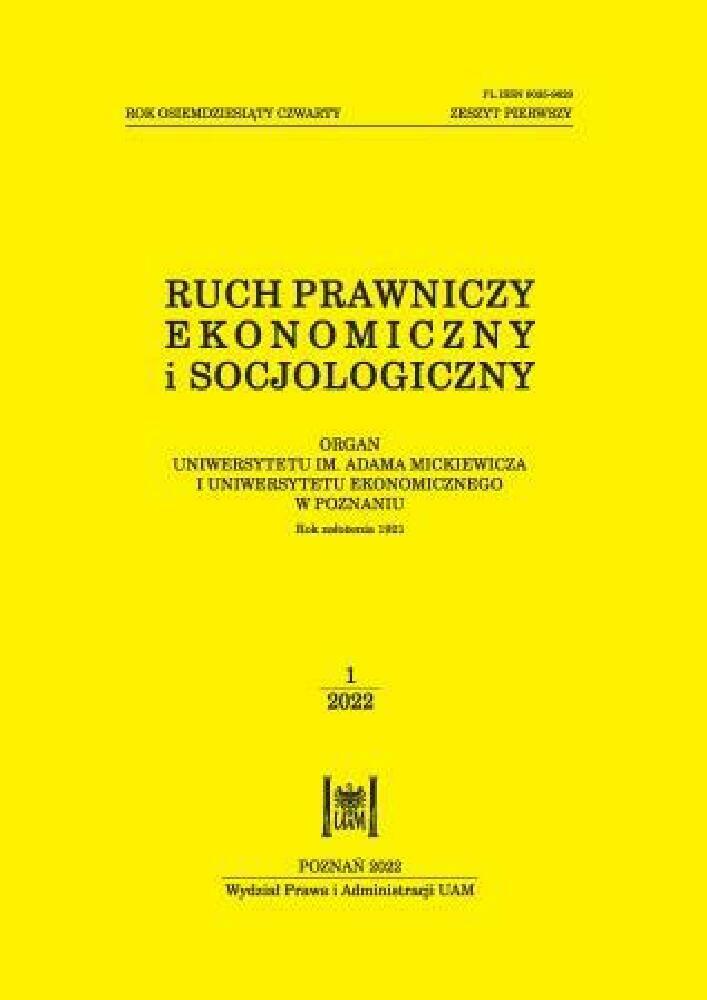Abstract
Uber, Airbnb, CouchSurfing, Netflix, electric scooters: all of these have become part of our daily lives, just as Allegro.pl, Amazon.com and other network economy businesses already have. Even so, according to their promoters they are a harbinger of a new order. For the market economy, with its anonymous market, sharing economy practices are to be what institutions of direct citizen influence on political decisions are to representative democracy. The economy will at last begin to fulfil actual human needs instead of producing superfluous things on a mass scale. The Earth’s devastation and the wasteful exploitation of its resources will cease. Old pre-capitalist economy institutions, spread all over the globe by means of the Internet, will empower the people marginalized by the market and reconstruct the communities weakened by it. Trust will be the greatest capital at people’s disposal, both in the local and global exchange of things and services. I do not estimate how realistic this promise is; all I do is present, from the perspectives of both sharing economy advocates and its critics, the specific institutions (in the sociological sense) meant to deliver on it. In the summing-up I highlight the ambivalence towards the market economy that the very idea of sharing itself is burdened with, and consequently, the ambiguity of its self-professed mission: is to be a mere correction to the present-day form of capitalism or an alternative to it?
References
Abramowski, E. (1965). Filozofia społeczna. Wybór pism. Warszawa.
Abramowski, E. (2009). Braterstwo, solidarność, współdziałanie. Pisma spółdzielcze i stowarzyszeniowe. Wyb. i oprac. R. Okraska. Łódź–Sopot–Warszawa.
Becker, J. (2017). Im mniej, tym więcej. Tłum. Wiesław Marcysiak. Kraków.
Belk, R. (2014). Sharing versus pseudo-sharing in Web 2.0. Anthropologist 18(1): 7–23.
Botsman, R., Rogers, R. (2010). What’s Mine is Yours. How Collaborative Consumption Is Changing the Way We Live. London.
Cohen, M.J. (2015). Toward a post-consumerist future? Social innovation in an era of fading economic growth, [w:] L.A. Reisch, J. Thøgersen (eds.), Handbook of Research on Sustainable Consumption. Cheltenham, UK–Northampton, MA, USA: 426–442.
Gansky, L. (2010). The Mesh: Why the Future of Business Is Sharing. New York.
Jemielniak, D. (2013). Życie wirtualnych dzikich. Netnografia Wikipedii, największego projektu współtworzonego przez ludzi. Warszawa.
Kopytoff, I. (2013). Kulturowa biografia rzeczy – utowarowienie jako proces. Tłum. E. Klekot, [w:] Badanie kultury. Elementy teorii antropologicznej. Kontynuacje. Wyb. i przedm. M. Kempny, E. Nowicka. Wydawnictwo Naukowe PWN: Warszawa.
Martin, Ch.J. (2016). The sharing economy: a pathway to sustainability or a nightmarish form of neoliberal capitalism? Ecological Economics 121(C): 149–159.
Mauss, M. (2001). Szkic o darze. Tłum. M. Król, K. Pomian, J. Szacki, [w:] M. Mauss, Socjologia i antropologia. Warszawa.
Bauwens, M., Kostakis, V. (2014). From the communism of capital to capital for the commons: towards an open co-operativism. TripleC 12(1): 56–65.
Srnicek, N., Williams, A. (2016). Inventing the Future: Postcapitalism and the World without Work (revised and updated edition). London–New York.
Rifkin, J. (2003). Wiek dostępu. Nowa kultura hiperkapitalizmu, w której płaci się za każdą chwilę życia. Tłum. E. Kania. Wrocław.
Rifkin, J. (2016). Społeczeństwo krańcowych kosztów zerowych. Internet przedmiotów, ekonomia współdzielenia, zmierzch kapitalizmu. Tłum. A.D. Kamińska. Warszawa.
Schor, J.B., Connor, F., Carfagna, L.B. (2016). Will Attwood-Charles, Emilie Dubois Poteat, Paradoxes of openness and distinction in the sharing economy. Poetics 54: 66–81.
Slee, T. (2017). What’s Yours is Mine: Against the Sharing Economy. New York.
Śledziewska, K., Włoch, R. (2020). Gospodarka cyfrowa. Jak nowe technologie zmieniają świat. Warszawa.
Waśkiewicz, A. (2020). Ludzie – rzeczy – ludzie. O porządkach społecznych, w których rzeczą łączą, a nie dzielą. Kraków.
<https://www.national-geographic.pl/artykul/rzeczy-stworzone-przez-nasza-cywilizacje-waza-wiecej-niz-wszystkie-formy-zycia-na-ziemi> [dostęp: 22.02.2021]
License
Copyright (c) 2022 WPiA UAM

This work is licensed under a Creative Commons Attribution-NonCommercial-NoDerivatives 4.0 International License.





